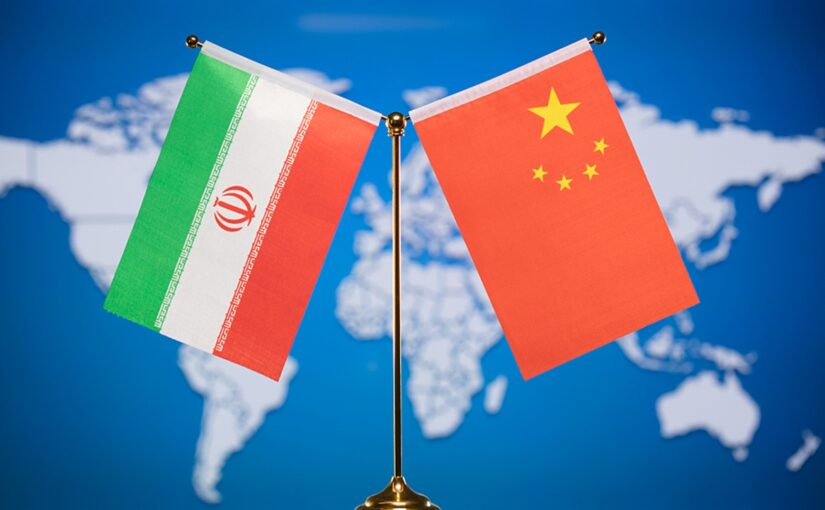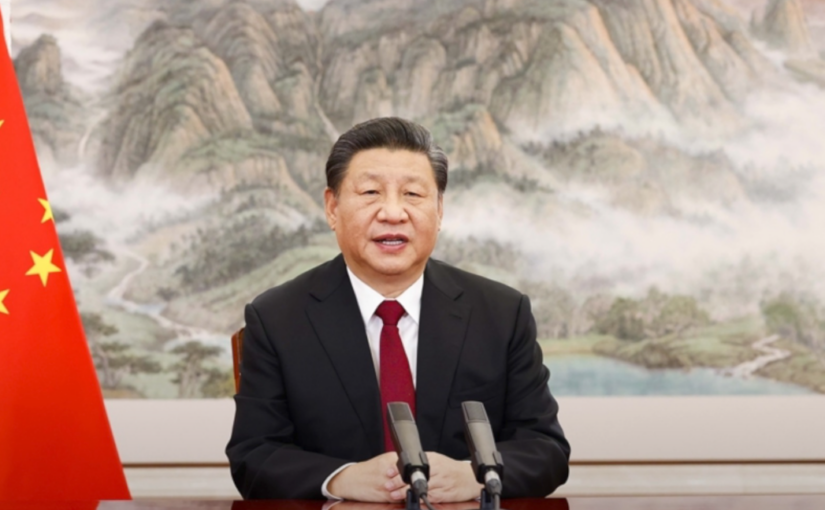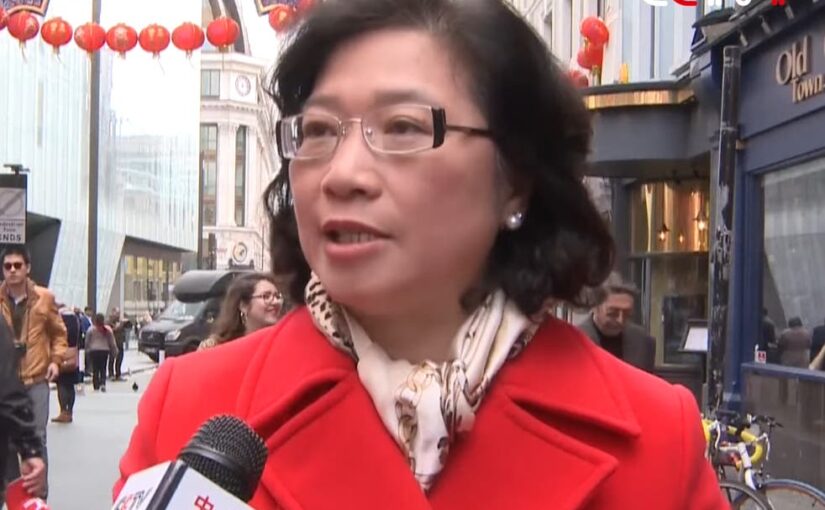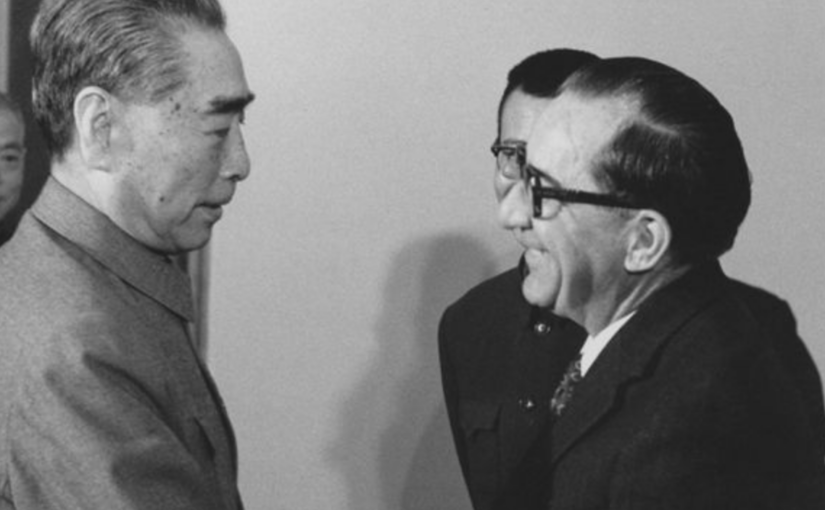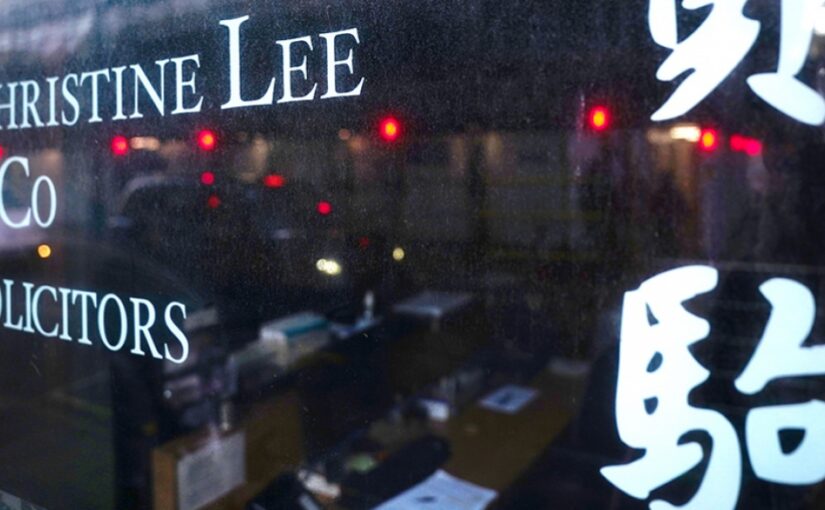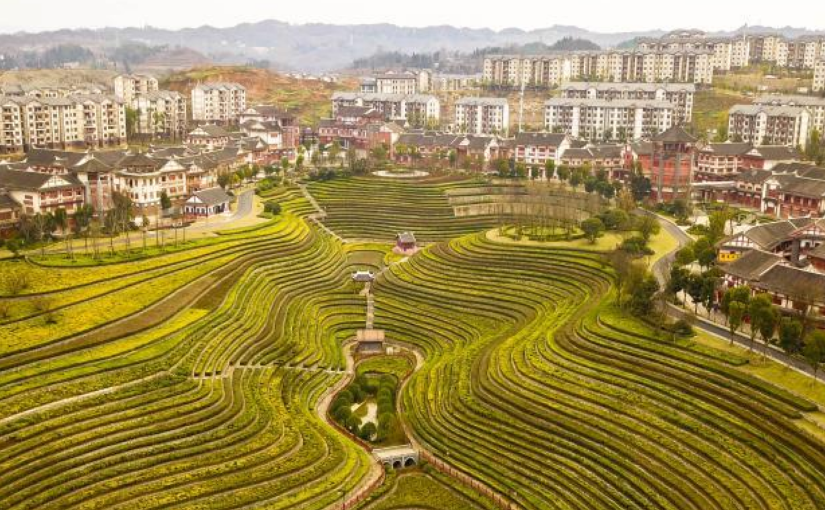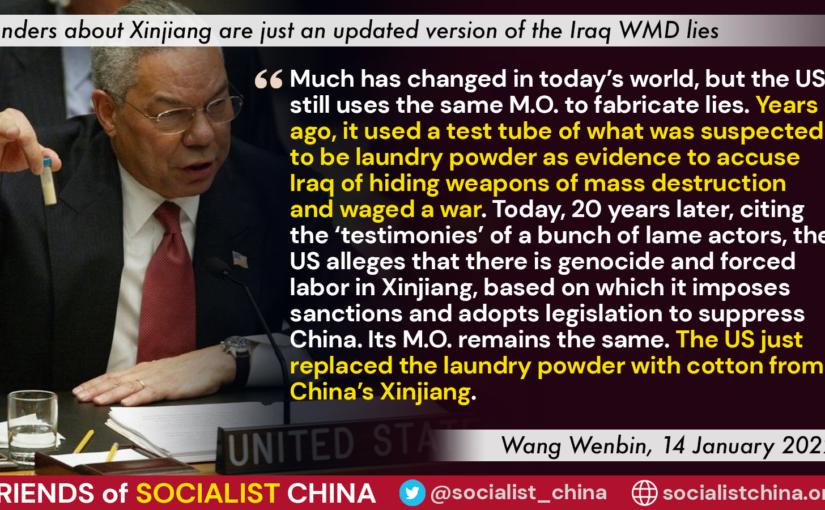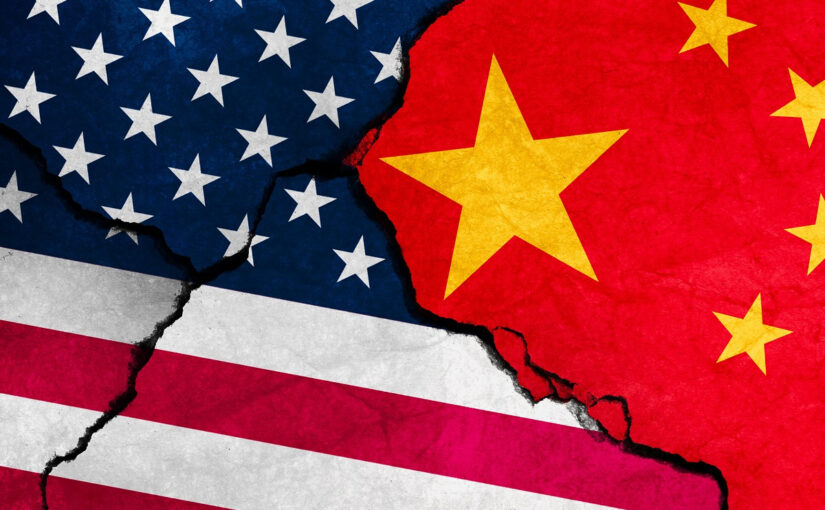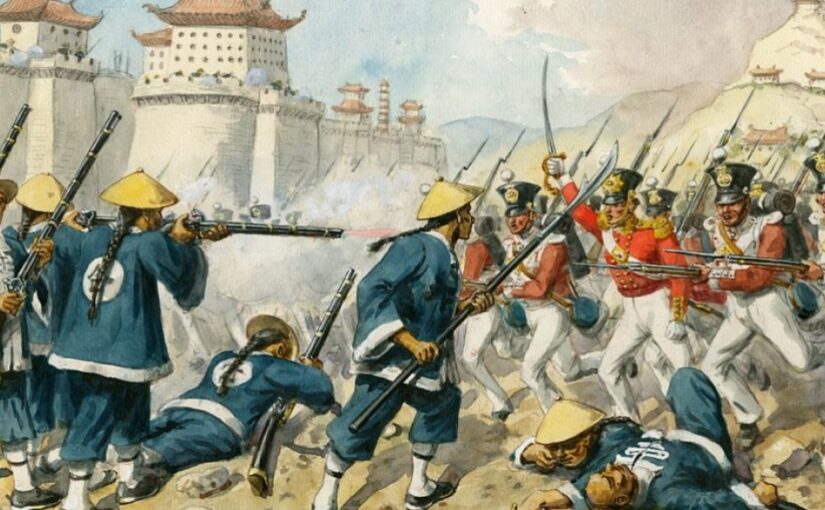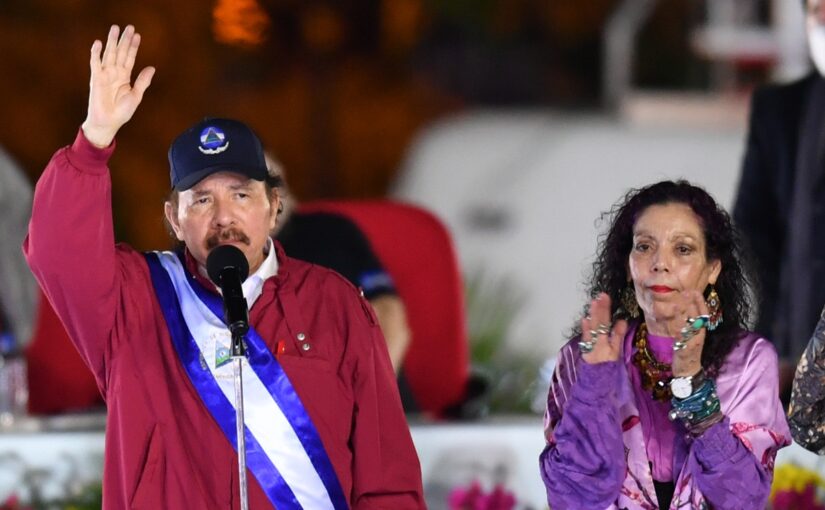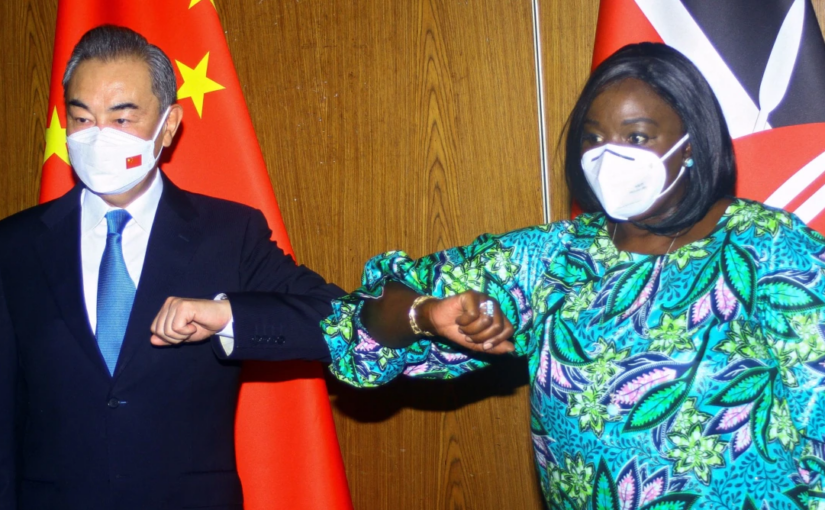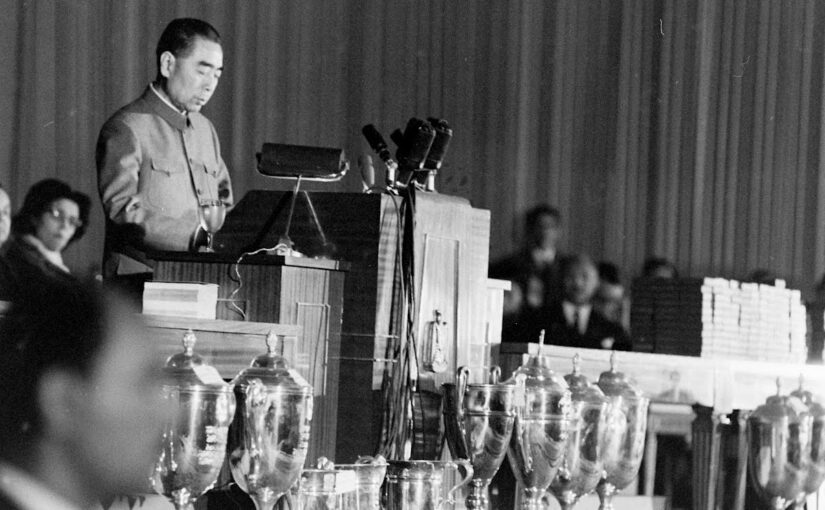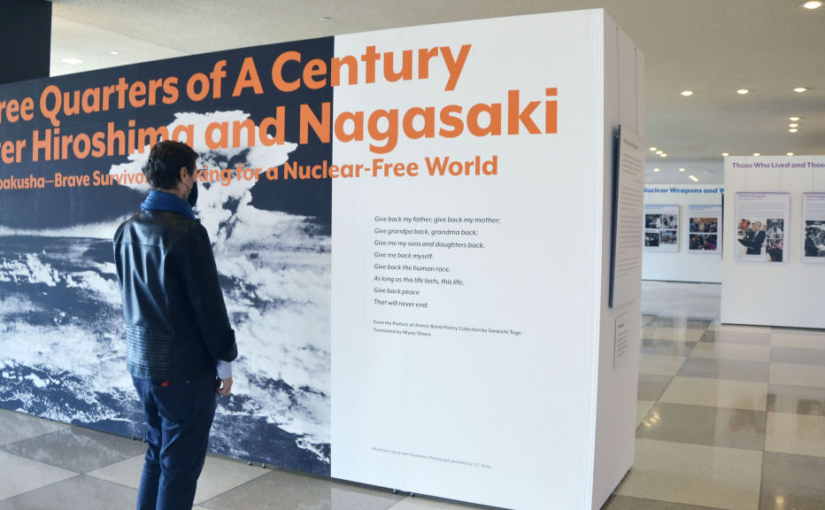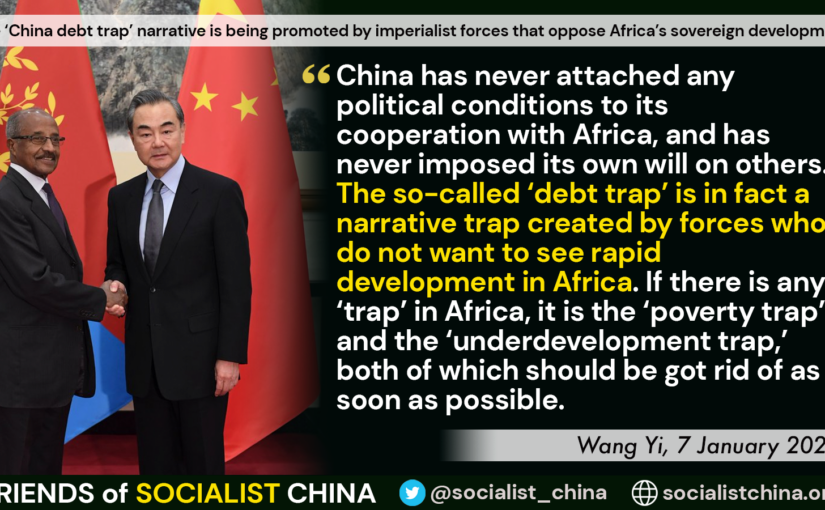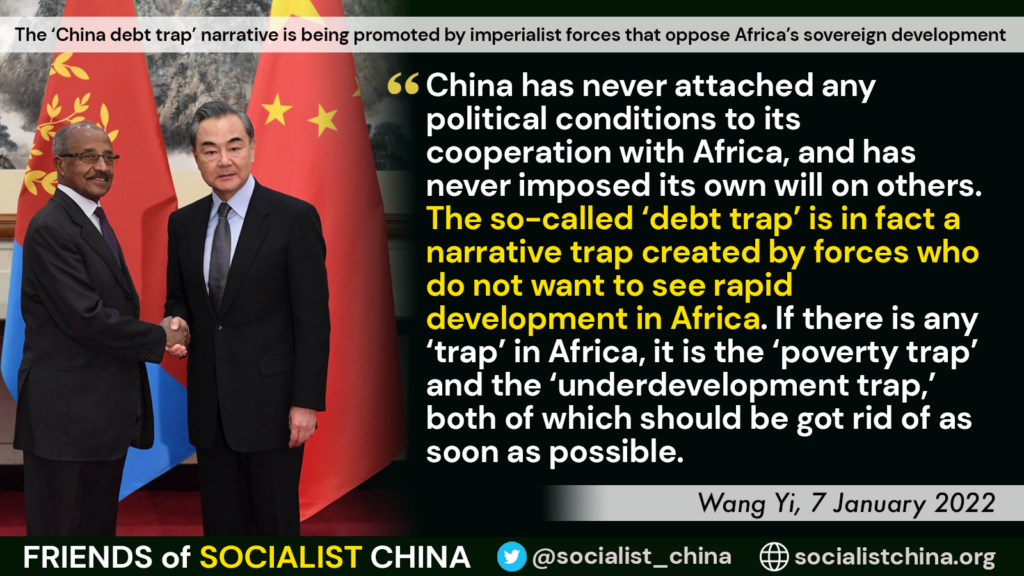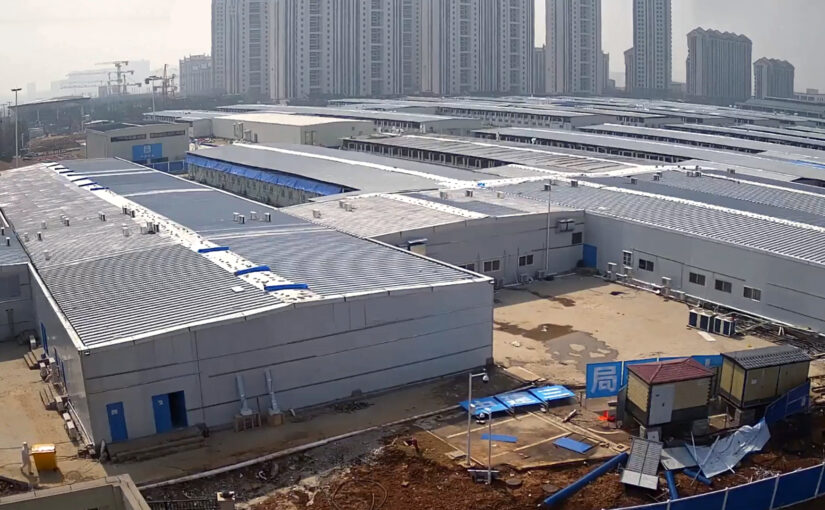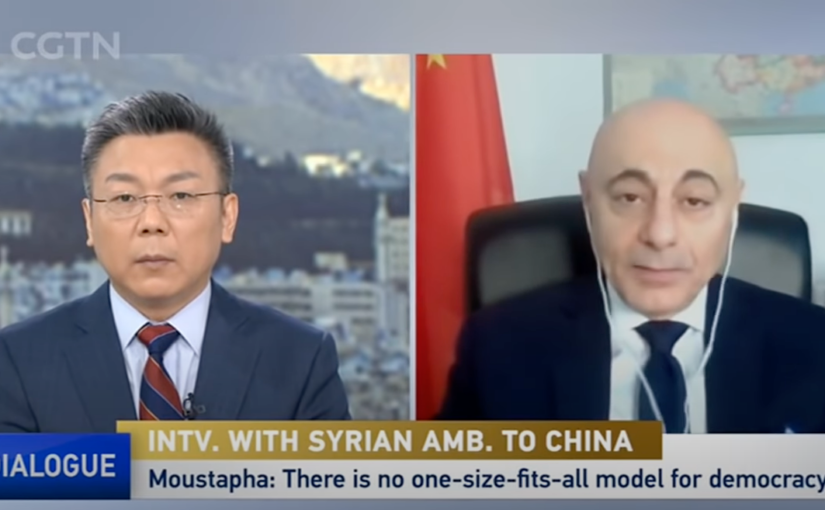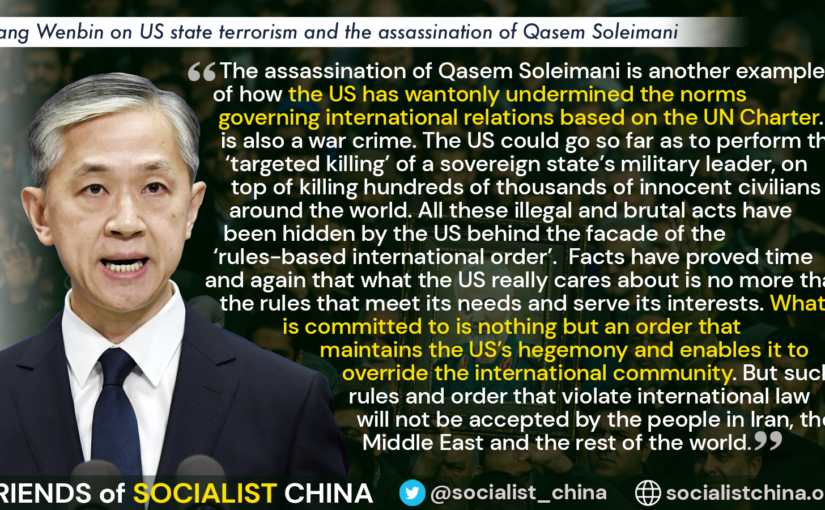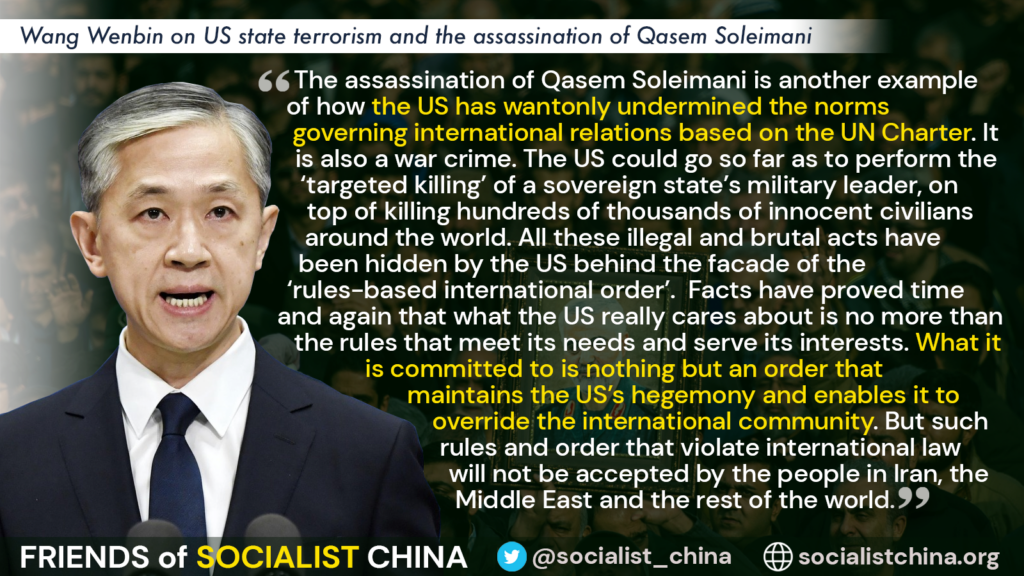We are very pleased to republish this important article on the internationalist activities of Premier Zhou Enlai by Chinese scholars Han Tongyou and Xu Zhengfei. This English language version was originally machine translated by Dongsheng’s Chinese Voices, to whom grateful thanks.
Zhou Enlai, whose 46th death anniversary fell on January 8th, was New China’s first Premier, serving from the founding of the People’s Republic in 1949 to his death in 1976. He also doubled up as the PRC’s first Foreign Minister, 1949-58. He was a tireless worker, an extraordinary statesperson and an outstanding Marxist-Leninist. He is still remembered with boundless respect and affection by the Chinese people and progressive people around the world.
In this article, Han and Xu comprehensively outline how, integrating patriotism and internationalism, Premier Zhou stood on the side of the socialist countries and firmly supported struggles against imperialism and the process of decolonisation. In particular, he brilliantly applied and creatively enriched and developed Lenin’s thesis of peaceful coexistence for a period in which the existence of states with different and varying social systems had proved to be a phenomenon of considerable historical duration. On this basis, he advanced proletarian diplomacy and the theory and practice of the united front regarding the nationalist regimes of various hues that developed in the formerly colonised countries especially from the 1950s onwards.
The authors correctly assert that Zhou’s practice and example played a major role in laying the long-term groundwork for today’s Belt and Road Initiative (BRI) as well as the concept of building a community with a shared future for humanity. He personally visited more than 18 countries along the Belt and Road and his Five Principles of Peaceful Coexistence and Eight Principles in Foreign Aid have stood the test of time.
Executive Summary
Among the countries along the Belt and Road today, Zhou Enlai, the world’s most distinguished diplomat, has personally visited more than 18 countries and established diplomatic relations with more than 36 countries, which has had a wide and far-reaching impact. This article explores Zhou Enlai’s diplomatic activities with countries along the Belt and Road, analyzes his design for spreading China’s voice and telling China’s story, and demonstrates his remarkable contribution to shaping China’s international image and showcasing the charm of a great power. Zhou Enlai’s thoughts and practices are of great relevance to us today in implementing the “Belt and Road” initiative and promoting the community of human destiny.
Keywords: Belt and Road, Zhou Enlai diplomacy, peaceful coexistence, seeking common ground while preserving differences
“Zhou Enlai is a glorious name, an immortal name.” During his 26 years of leadership and diplomatic work, Zhou Enlai personally visited more than 18 countries along the “Belt and Road” and established diplomatic relations with more than 36 countries, creating a new situation in the diplomatic career of the new China, greatly enhancing China’s international prestige, demonstrating China’s image as a great power to the world, and making a great impact. It has greatly enhanced China’s international prestige, demonstrated China’s image as a great power to the world and had a great impact.
In 2013, after General Secretary Xi Jinping proposed the idea of jointly building the Silk Road Economic Belt and the 21st Century Maritime Silk Road, the Belt and Road Initiative gradually entered the domestic and international horizon. On March 27, 2015, authorized by the State Council, the National Development and Reform Commission, the Ministry of Foreign Affairs and the Ministry of Commerce jointly issued the “Vision and Action for Promoting the Construction of the Silk Road Economic Belt and the 21st Century Maritime Silk Road”. The introduction of this document marked the decision of the “Belt and Road” initiative into the implementation and construction phase.
In response to the ever-changing international and domestic situation, Zhou Enlai spoke on several occasions in February 1957 about the division of the nature of countries at that time, mainly socialist countries, nationalist countries and imperialist countries, and then clarified China’s foreign policy: unite socialist countries for the better; fight for national independent countries and make a good united front; against imperialism, be vigilant and guard against war, but not to take the initiative. There are many socialist and nationalist countries in the “Belt and Road”.
First, it will strengthen contacts with socialist countries, open up a new pattern of diplomacy for the new China, and establish a new national image.
China was a socialist country. The capitalist camp, represented by the United States, and the socialist camp, led by the Soviet Union, were strongly opposed to each other, and because of the extreme hostility of the capitalist countries to the new China, it was decided that China could only adopt a “one-sided” foreign policy and join the socialist camp. Thus, within three months of the founding of New China, 11 countries with which China established diplomatic relations were all socialist countries, including Mongolia, Vietnam, Poland, Bulgaria, Albania, Czechoslovakia, Hungary, Romania, and the Soviet Union, which later split into 15 independent states. The establishment of diplomatic relations was only the first step in the political interaction between countries; the promotion of all aspects of the country’s development was the fundamental goal, and for this reason Zhou Enlai was frequently active on the international stage.
The old China was poor, and after many years of war, the new China was in need of reconstruction. In order to restore and develop the national economy, Zhou Enlai visited the Soviet Union under Stalin three times and signed a series of economic, political, diplomatic and military contracts, which led to all-round cooperation between the two sides. In particular, during the implementation of China’s first five-year plan, Zhou Enlai actively carried out diplomacy with the Soviet Union to restore the national economy, achieving remarkable results and promoting the development of China’s socialist construction. Vietnam has a long history of relations with China and is a socialist country. As the leader of Vietnam’s national liberation and independence, Ho Chi Minh and Zhou Enlai shared a deep revolutionary friendship, which made the Sino-Vietnamese relations extraordinary. Unlike Sino-Soviet relations, Sino-Vietnamese relations were more about China’s help to Vietnam, such as helping Vietnam to resist the aggression of the French and American imperialists and helping them to develop their national economy. Zhou Enlai visited Vietnam seven times and brought a lot of military supplies, loans and technology, which were warmly welcomed by the Vietnamese people. The situation of Mongolia was similar to that of Vietnam, and it was also a country that needed China’s assistance. Zhou Enlai visited Mongolia 2 times and gave it necessary help from both political and economic aspects to promote its development.
Poland and Hungary were both Eastern European countries that achieved national independence and built socialism with the help of the Soviet Union. However, after Stalin’s death, due to Khrushchev’s criticism of Stalin, the Polish- Hungarian Incident occurred, the Soviet Union sent troops to Hungary, and the socialist camp was momentarily divided. In this situation, Zhou Enlai visited these two countries from January 11 – 17, 1957, in order to maintain the unity of the socialist camp. In Poland, Zhou Enlai put forward eight proposals, which were welcomed by the Polish party members, who said: “There are many interesting, interesting and useful things in Premier Zhou Enlai’s speech, which we will study carefully”; Hungary was badly damaged and the country was in difficulties, so Zhou Enlai came to the capital personally, despite the danger to his personal security. It touched the whole Hungary.
In his dealings with these socialist countries, Zhou Enlai gave full play to his high diplomatic skills and noble personality, and achieved outstanding diplomatic success. On the one hand, China received assistance from the Soviet Union, which stabilized the domestic situation and promoted the construction of China in all aspects. On the other hand, from the economic, military and diplomatic aspects, China assisted other socialist countries, helping them to oppose aggression, achieve national independence, develop socialist economy, and strengthen the socialist camp. Second, to enhance exchanges with nationalist countries, develop good neighborly relations and establish the image of a great power.
In the late 1950s, as the domestic situation in China and the Soviet Union changed and the two parties diverged on the line of the international communist movement, the “one-sided” pattern became untenable, and Chinese diplomacy, under the direct leadership of Zhou Enlai, gradually developed an independent diplomatic line based on the Five Principles of Peaceful Coexistence. It focused on developing relations with nationalist countries.
China and other Asian and African countries had a common situation, they had just overthrown the colonial rule, gradually mastered their own destiny and future, and shared common development needs, so it was easier to gain mutual understanding, and the rapid development of the new China gradually attracted their attention. By the time of the Asia-Africa Conference in 1954, 22 countries had formally established diplomatic relations with China, including 12 socialist countries and 10 nationalist countries, and countries along the “Belt and Road” such as India, Burma, Indonesia, Pakistan and Afghanistan, followed by Nepal, Ceylon (later renamed Sri Lanka), Cambodia, Egypt and Turkey. The “One Belt and One Road” countries such as India, Burma, Indonesia, Pakistan, Afghanistan, followed by Nepal, Ceylon (later renamed Sri Lanka), Cambodia, Egypt, and Turkey also established diplomatic relations with China.
In relations with Southeast Asian countries, Zhou Enlai always adhered to the policy of peaceful and good-neighborly relations and resolved the border dispute issue well. The Sino-Burma border issue is a good example of China’s handling of border issues. Zhou Enlai pointed out at the border demarcation meeting that “this work needs to be done very carefully and prudently; to stand firm on the national position and to take care of friendly relations; to draw the border in a practical way and not to lose our sovereignty.” In order to solve the border issue, Zhou Enlai proposed the principle of “mutual understanding and compromise”, and after many rounds of consultations, surveys and negotiations, an agreement was finally reached and the border was demarcated. Myanmar’s Prime Minister U Nu commented on the matter: “I and some people in the Myanmar government were satisfied, and the diplomatic team of the cabinet also considered the Prime Minister’s proposal to be reasonable. Using this as an example, China went on to successfully resolve border issues with Nepal, Afghanistan, Pakistan and other nationalist countries respectively, securing a peaceful environment for China’s socialist construction at the time.
In order to better develop domestic economic construction, Zhou Enlai also actively developed economic and trade exchanges with nationalist countries. He emphasized : “The purpose of foreign trade is to develop production so that products can be sold and materials necessary for the country can be bought in.” In the autumn of 1952, Zhou Enlai asked the Ministry of Foreign Affairs to conduct state negotiations with Ceylon, which culminated in the signing of an economic and trade agreement to exchange rubber for rice, meeting the respective development needs of both countries. Starting from 1956, China began to provide economic aid to Cambodia, supplying various commodities and materials free of charge and helping to build complete equipment projects, making Cambodia the first country in which China provided free aid to a nationalist country. Thanks to Zhou Enlai’s extraordinary diplomatic achievements, the political status of the new China was improved and the development of China’s trade with Asian and African nationalist countries advanced a big step. After the Bandung Conference, China launched government-to-government trade activities with Syria, Lebanon, Yemen, Afghanistan, Iraq, Pakistan, Nepal and other countries one after another. In Africa, Zhou Enlai worked with Egyptian President Nasser to promote the development of trade between the two countries. He also sent Foreign Trade Minister Ye Jizhuang to organize the opening ceremony of the China Commodity Trade Fair in Egypt, which expanded China’s influence in Africa and subsequently more than 10 African countries established trade relations with China.
During his premiership, Zhou Enlai promoted a large number of foreign affairs activities with countries along the “Belt and Road”, with the following main features:
First, the development concept of opening up to the outside world is proposed. Although Zhou Enlai did not explicitly put forward the concept of “opening up to the outside world” during his lifetime, he had already reflected this concept in his discussions on foreign politics, economy, diplomacy and culture. Zhou Enlai pointed out that “any country in construction, any country in the world, cannot be completely closed and self-sufficient, but always in need of each other”, and therefore “the idea of building behind closed doors is also wrong. He explained the historical necessity of opening up to the outside world from the height of the times. In response to the economic and cultural backwardness of China at that time, Zhou Enlai said in a foreign affairs conversation with the Prime Minister of Pakistan on October 19, 1956 that “China itself has lagged behind for a century” and that “the world science has made particularly great and rapid progress in the last twenty or thirty years, and these advances have left us These advances have left us far behind in the development of science.” General Secretary Xi Jinping clearly pointed out in his speech at the symposium commemorating the 120th anniversary of the birth of Comrade Zhou Enlai that Zhou Enlai attached great importance to learning advanced foreign technology, emphasizing that “to dare to learn from the strengths of all countries is the expression of the greatest self-confidence and self-respect, and such a nation must also be a nation capable of self-reliance.” In his foreign affairs activities, he emphasized the importance of learning and advocated learning from all countries. “We must learn not only from the Soviet Union and from our brother countries, but also from all countries in the world, including those that are peaceful and neutral, such as India, Burma, Indonesia, Egypt, etc.” It can be seen that Zhou Enlai’s idea of opening up to the outside world has broken through the shackles of ideology and social system and embodies visionary insight. He insisted on the principles of equality and mutual benefit, mutual benefit and common development, and advocated learning from all the strengths of these countries.
Learning from the Soviet Union had become a trend at the beginning of the new China, and Zhou Enlai was also the driving force behind the “learning from the Soviet Union”. He said: “The Chinese people are now working on their first five-year construction plan. In order to ensure the success of this construction, it is necessary to learn from the advanced experience of socialist construction in the Soviet Union, as Comrade Mao Zedong has often called for, honestly and diligently. The Soviet Union’s today is our tomorrow.” With the arrival of large numbers of Soviet experts in China, a nationwide movement was formed calling for the study of Soviet experts’ knowledge and technology as well as ideas, styles and methods, which promoted the construction and development of early New China and laid the foundation for China’s later national economy. Zhou Enlai often asked to take the initiative to study the advanced technology outside and to exchange with an attitude of learning. When reviewing the program of the Song and Dance Troupe of the Political Department of Xinjiang Military Region, which was to perform in Egypt and other African countries, he told the actors that you were the first ones to go to Africa and were the advance team of diplomatic work, so you should learn from the African people with an open mind in order to express the deep love and friendship of the Chinese people to them, and never have a big country mentality, but learn the advanced aspects of other countries to better promote the development of our country.
Second, adhering to the unity of patriotism and internationalism. Zhou Enlai was a model of unity between patriotism and internationalism. In 1952, he clearly pointed out in “Our Foreign Policy and Tasks” that the guiding ideology of the new China’s diplomacy was “to adhere to internationalism and oppose narrow nationalism” and “to adhere to patriotism and oppose cosmopolitanism”. Our internationalism is to make all countries independent and equal” and “socialist patriotism is not narrow nationalism, but patriotism that strengthens national self-confidence under the guidance of internationalism”.
In the early days of the founding of the People’s Republic of China, the new China adopted a “one-sided” foreign policy and fell back on the socialist camp. Zhou Enlai called for the development of the spirit of internationalism, the unification of the socialist countries, the establishment of a united front, the exchange of benefits and disadvantages, and active support for the cause of independence and liberation of the Third World. After the outbreak of the Suez Canal incident in 1956, Zhou Enlai quickly issued a statement condemning the aggression of the British and French governments and supporting the Egyptian people’s war against aggression; subsequently, Zhou Enlai, on behalf of the Chinese government, offered a cash donation of 20 million Swiss francs to the Egyptian people. Zhou Enlai then donated 20 million Swiss francs in cash to Egypt on behalf of the Chinese government, fully embodying the spirit of internationalism and winning the friendship of the Egyptian people.
As the international environment developed and changed and the Sino- Soviet conflict escalated, Zhou Enlai promptly adjusted China’s diplomatic strategy from the hegemonic rule of the two superpowers of the United States and the Soviet Union to the struggle for the “two middle zones” and active support for the just struggles of the peoples of Asia, Africa and Latin America. In developing diplomatic relations with these countries, Zhou Enlai’s internationalist spirit was brought into full play. He visited many countries along the “Belt and Road”, fully exchanged views with their leaders on issues of national independence and liberation, and actively provided assistance to them. For example, economic and technical assistance has been a long-standing foreign policy of China since 1956, when he assisted Cambodia.
Between 1956 and 1960, China and Mongolia signed three agreements on economic and technical assistance, and provided Mongolia with one non- refundable aid amounting to 160 million rubles and two long-term loans totaling 300 million rubles to help Mongolia develop its economy. Later, China also provided economic and technical assistance to Albania, Hungary, Cuba, Burma, Ceylon (now Sri Lanka), Egypt, Guinea, Algeria, Nepal, Yemen, Pakistan, Indonesia, Laos, Syria and other Asian and African countries. Even during the difficult period of China’s national economic development, such as the Cultural Revolution, foreign aid has continued. China has always believed that foreign aid is China’s internationalist obligation, and it is also very beneficial to its own construction. In 1962, Zhou Enlai pointed out: “The victorious Chinese people, while carrying out socialist construction, must also, according to the possible conditions, give assistance to brotherly and nationalist countries, which is our inescapable internationalist obligation. …… their construction work well, and their strengthened opposition to imperialism is an important support to our socialist construction cause”. During his visit to Africa in 1963 – 1964, Zhou Enlai put forward the famous eight principles of foreign aid During his visit to Africa in 1963-1964, Zhou Enlai put forward the famous eight principles of foreign aid, which fully embodied the spirit of Chinese internationalism and was thus well received and praised by the countries concerned.
Third, we are committed to creating a peaceful and stable international environment. At the very beginning of the founding of New China, Zhou Enlai put forward the idea that “we urgently need a peaceful national environment to develop our independent economy”. The foreign policy of seeking world peace is in line with China’s need to build socialism and the aspirations of peace-loving people around the world. In accordance with the post-war Cold War pattern of U.S.-Soviet hegemony, Zhou Enlai developed Lenin’s idea of peaceful coexistence and creatively put forward the Five Principles of Peaceful Coexistence, which was used to solve some border and territorial disputes. There is no reason why international disputes cannot be resolved through consultation”. He presented China’s “Declaration of Peace” to the conference, on the basis of which the conference eventually adopted the ten principles. Since then, the Five Principles of Peaceful Coexistence have gradually become a universally accepted diplomatic principle for all countries in the world and have been written into the UN Charter, promoting the cause of world peace.
Zhou Enlai advocated the five principles of peaceful coexistence and firmly opposed hegemony. He once proposed a criterion to measure whether a country could be a friend of China, namely, “the main key to the distinction is the attitude toward war and peace”. If any country, regardless of its size, strength, development or backwardness, dares to launch a war of aggression, the Chinese government will stand up and condemn it. For example, China actively supported and supported the victim countries in the war against France in Vietnam, the war against the United States in Korea, and the war against Britain and France in Egypt.
During Zhou Enlai’s premiership, there were continuous international wars. China’s economic development, coupled with the instigation of some Western countries, aroused the fears and fears of some countries, who feared China’s foreign aggression when it became strong. The Burmese ambassador to China, U Nu Maw, said frankly in a conversation with Mao Zedong and Zhou Enlai: “I am afraid of Chinese aggression, I am really afraid. Based on this, Zhou Enlai repeatedly stated the Chinese government’s position on foreign affairs occasions. During his visit to Vietnam, he particularly emphasized the position of the new China: “I would like to offer a pledge that China will always abide by the five principles and resolutely oppose chauvinism of the great powers, so as to strengthen friendship and solidarity among nations.” During the meeting with the Prime Minister of Pakistan, who visited China, he pointed out: “As soon as China develops, it must be imperialism, which is something we cannot agree with”, “The question is not whether a country is strong and developing, but whether its policies and institutions threaten people “. Our country is a socialist country, which is against colonialism and imperialism. China has also suffered from aggression, and the lessons of history do not allow China to invade other countries. Zhou Enlai’s series of diplomatic activities dispelled other countries’ doubts about China and firmly established good-neighborly and friendly relations with China.
General Secretary Xi Jinping spoke highly of Zhou Enlai’s diplomacy: “Comrade Zhou Enlai’s profound diplomatic thinking, colorful diplomatic practice, unique diplomatic art and diplomatic style have won the universal respect of people around the world and international friends, and earned the Party and the country a high international reputation.” Although Zhou Enlai’s diplomatic legacy belongs to history, much of it has been applied to all aspects of contemporary China and has influenced Chinese politics, from Deng Xiaoping to Xi Jinping and up to today’s “One Belt, One Road” strategic approach.
Peaceful coexistence is the primary prerequisite for promoting the Belt and Road Initiative. The concept of “peaceful coexistence” was first introduced by Lenin as a diplomatic concept for socialist countries to have normal relations with other countries. Zhou Enlai developed it into a diplomatic guideline for the new China to get along with other countries, uniting the vast number of Asian, African and Latin American countries and expanding the international united front for peace. With the rapid development of China’s economy in the 21st century, China’s comprehensive national power has become the forefront of the world, and it has increasingly moved closer to the center of the world stage, but local turmoil and strife still exist in the world today. Therefore, China still has to inherit Zhou Enlai’s diplomatic idea of peaceful coexistence and firmly follow the road of peaceful development. “The Belt and Road Initiative is an important initiative for China to adapt to the new situation of economic globalization and build a new system of open economy. The “Vision and Action for Promoting the Construction of the Silk Road Economic Belt and the 21st Century Maritime Silk Road” clearly proposes to “abide by the five principles of peaceful coexistence, namely, respect for the sovereignty and territorial integrity of all countries, non-aggression, non- interference in each other’s internal affairs, equality and mutual benefit, and peaceful coexistence”. This shows that the diplomatic concept of peaceful coexistence is still the most basic principle of interaction between countries in today’s world and has universal significance. General Secretary Xi Jinping pointed out: “Under the new situation, the spirit of the Five Principles of Peaceful Coexistence is not obsolete, but deeper than ever; the meaning of the Five Principles of Peaceful Coexistence is not diluted, but newer than ever; the role of the Five Principles of Peaceful Coexistence is not weakened, but stronger than ever.” In the case of the “Belt and Road” initiative, China is more active in interacting, exchanging and cooperating with relevant countries under the premise of the Five Principles of Peaceful Coexistence, and promoting the development of both sides for a better future.
Common development is the long-term goal of promoting the “Belt and Road” initiative. An important feature of Zhou Enlai’s diplomatic thinking is his insistence on the unity of internationalism and patriotism. In his article “Our Diplomatic Policy and Tasks,” he pointed out that we should not only insist on patriotism and oppose the “cosmopolitanism” of losing national self-confidence and deferring to the big powers, but also “uphold internationalism and oppose narrow nationalism” and firmly “establish the idea of internationalism.” [32] After that, he repeatedly expressed in public the need to carry forward the spirit of internationalism, to unite and support the peoples of the world, and to promote common development. On this basis, he further proposed the “Peaceful Economic Policy,” the connotation of which is “to oppose the imperialist policy of destroying national economies, enslaving human beings, and impoverishing people by seeking the prosperity and development of human beings throughout the world. The aim is to achieve human prosperity and economic development.” And the aim of our Communists “is to make the world a better place, so that everyone can live and live well.” Zhou Enlai’s idea of common development is still worth inheriting and carrying forward in the new situation. The vision of building a community of human destiny proposed by General Secretary Xi Jinping in the “Belt and Road” initiative is a continuation of Zhou Enlai’s thought on peace diplomacy, and at the G-20 summit in 2013, Xi called on “all countries to build a sense of community of destiny, cooperate in competition, and win together in cooperation. Take into account the interests of other countries while pursuing their own interests, and take into account the development of other countries while pursuing their own development. Let each country’s development create a linkage effect with the growth of other countries.” China hopes to build an “open, inclusive and diversified” community through the Belt and Road to achieve common development and win-win cooperation.
